In Search of Chipoko…
Investigative essay by Justine Isernhinke, Fellow and Head of Geopolitics and UAP Research, The Malone Institute
In Search of Chipoko…
PART 1 of 3
What, you may ask, is chipoko?
Like many African words, it means a number of things as well as a general concept. The general concept is that it is used for something that cannot be identified or known - the inexplicable. Depending on the context, it can mean UFOs, lights in the sky, ghosts, apparitions, your ancestors and just about anything else that would fit into the paranormal.
In exploring the UFO/UAP subject, I discovered that my friend, Nick, amongst his many areas of expertise in the safari industry, has also seen unidentified anomalous phenomena in Zimbabwe, i.e. chipoko. The locals in Zimbabwe usually use the term chipoko for ghostly apparitions manifesting with a “candlelight” color, associated with the spiritual - such as an unhappy soul refusing to pass on peacefully, or the souls of people who have been wronged by their relatives. But this is only one of the meanings they attribute to the term.
“I think the candlelight descriptions perfectly match the modern Westernized understanding of UFO's or “UAP's” or whatever they’re now trying to rebrand the topic with. If you dig a little deeper culturally and try to understand the significance of indigenous chipoko accounts, then it’s particularly intriguing. The best I’ve heard was a tribal guy living in a remote area, who told me the chipokos came in the winter time and that once a chipoko had landed near his village and that a little driver had come out of it and met his uncle.” Says Nick Lynch, my guide on this extraordinary “X-Files Wire-wire Chipoko Safari” adventure.
Terminology in the UAP world is ever evolving as new theories are proposed as to what it is that people are seeing or experiencing. Zimbabwe’s Chipokos fit perfectly into the
Ultraterrestrial hypothesis -which is a theory where transdimensionality collides with quantum physics compounded by inexplicable aspects such as the apparent deliberate use of absurdity as part of deception and so-called “high strangeness”.
“…in the theorizing surrounding UAP, while most thinking involves two main classes of explanation – a conventional terrestrial origin, or an unconventional extraterrestrial one – there is also a third class: an unconventional terrestrial origin. This is sometimes called the ultraterrestrial hypothesis, an overarching category which includes the interdimensional hypothesis …This hypothesis is the highly speculative notion that UAP may reflect activities of beings from dimensions that coexist alongside the four dimensions of spacetime we humans usually perceive (i.e., three physical dimensions plus time). Hence ultra-terrestrial: such beings are already present in Earth’s environment in some sense, just not in ways we can conventionally understand.” ~ Lomas The Ultraterrestrial Hypothesis.
As I understand, chipoko, like many African words, means a number of things as well as a general concept. The general concept is that it is used for something that cannot be identified or known - the inexplicable. Depending on the context, it can mean UFOs, lights in the sky, orbs, ghosts, apparitions, your ancestors and just about anything else that would fit into the paranormal.
It was with this in mind that Nick suggested an X-Files Safari in Zimbabwe. Nick and I agreed to meet in Harare and embark on a mad-capped safari tour of Zimbabwe combined with a casual investigation of UAP and other associated mysteries, whilst at the same time viewing some wildlife and incredible scenery. If time permitted, we would visit our friend Nigel Kuhn who heads up the anti-poaching unit for the Conservation Wildlife Fund in Hwange National Park (See Part 3). As our trip was an informal tour and not an official investigation, we would ramble our way around the country (or wire-wire as locals say) in search of chipokos ...and scones.
Zimbabwe, formerly known as Rhodesia, is not most people’s first choice of African destination. Its recent past is filled with violence, war, starvation and deprivation.
Rhodesia was originally called Southern Rhodesia when it was part of the British Empire. (Northern Rhodesia is now Zambia). In 1965, it claimed independence from British rule. Shortly thereafter, an insurgency funded by the British government was led by Zimbabwe African People’s Union (ZAPU) and Zimbabwe African National Union (ZANU). This sparked into the Rhodesian Bush War.
What you will read in the propaganda-fueled Western world is that this war was the white rulers (the descendants of British colonials) against the local black population. But this simplistic view is merely perpetuated by those seeking a narrative that bolsters their agenda. (Sound familiar?)
The British, the Soviets and Communist China were supporting these insurgents for various reasons. The USSR and the PRC (People’s Republic of China) were looking to export their communist ideology within Africa as part of their ongoing proxy wars against the capitalist West, and the British were looking for a puppet that they could install to do their bidding, as the new government under Ian Smith was no longer compliant.
What you learn when you talk to the locals is that many black Zimbabweans fought in the Bush War alongside white soldiers. In fact, in most cases, the number of black soldiers vastly outnumbered the white soldiers. What is left out of most historical narratives is not only this, but also that ZAPU and ZANU decimated villages and massacred thousands of black Zimbabweans. The war could have been won by the Rhodesian government had the British not gone around the backs of the then-current government and made a deal with Robert Mugabe, naively thinking that he would be controllable. Instead, what followed after his coming to power was an inexorable decline of good government into what can only rightly be called a kraptocracy, replete with endemic corruption and authoritarianism. After the farm invasions, which was a land-grab by Mugabe to appease his opponents because he was losing popularity, permanently transformed the country from the “bread basket of Africa” to one of starvation. Fertile productive farm land was given to “war veterans” - many of whom were, at best, little kids during the war and likely never picked up a rifle and certainly never a plough. The war vets ravaged and plundered leaving nothing but denuded and barren land. Under “The Crocodile”, Ed Mnangagwa, Zimbabwe has stabilized significantly. The political landscape is settled and economic growth returning. However, similar to most other African countries, the Chinese have moved in en-force and a different form of economic colonization is taking place. “White” farms are being leased back to the white farmers brave enough to return and risk it all again and there is food on the shelves. It is safe - far safer than South Africa. The police force at the intermittent roadblocks are polite, courteous and professional. Not once were we asked for a bribe. I was impressed. Things are looking up for once for Zimbabweans.
We had a plan: rent a 4x4 (Honda Fit’s are not fit for most Zim roads, although Japan keeps dumping its used Honda’s here like China dumps cheap electronics in the States), and head to the Eastern Highlands, the mountain range bordering Mozambique, and specifically Mt. Nyangani (or Inyangani). From there, we would go south along the Rift Valley - which is the vast East African Rift that stretches all the way from Ethiopia, ending in South Africa.
At some point in the distant future, this East African fracture will separate and we shall have a breakaway African continent but that is in the far future, and thankfully no such breakage occurred whilst we were traversing its mountain peaks <sarcasm, for those impaired>. From there, we would head south, maybe Gonarezhou National Park, making it up as we go.
Of course, as we all know, the first rule in combat (read “life”), is that every plan unravels at the first gunshot, or in my case, at first destination. But more on that later.
I landed in Harare airport on a hot sunny Saturday in January, schlepping all sorts of first world amenities, including sleeping bag, poncho, ipad (loaded with movies and videos - god forbid, I get a moment to my own thoughts), books galore and plenty of sunscreen and mozzie spray.
Nick picked me in his cousin’s Toyota Prado which is what we had hoped to rent. However, somehow nature had gotten ahold of this Prada so a plethora of fauna and flora had taken up residence in part of the vehicle that no one could easily determine or eradicate, giving the car the pleasant smell of mold and - well - that very fungus that featured in The Last of Us…
We needed a new car. I was not prepared to travel in a mobile biosphere. Car rental was mission No. 1 for Monday morning.
As we meandered our way through the lush, almost tropical wealthy northern suburbs of Harare, Nick regaled me with all sorts of stories of chipokos - i.e. UFOs - he and his friends have seen in and around Harare. UFO sightings are so frequent in Zimbabwe, that if you haven’t seen one, you’re the odd one out.
That night we sat outside on the step of Greg’s house, who was our host. Every now and then our conversation was interrupted by a circadian-rhythmically-challenged trans-chicken.
Duck, as he was named, was rescued by Greg when he came across a man beside the road mishandling this young broiler. Broilers are always female and Duck certainly looked like a female chicken at the time. However, under Greg’s loving care, Duck discovered that he was a closet male and transitioned into a massive rooster in adulthood, replete with the charm of Lucifer. Towards the end of my trip, Duck would stalk me and attack me with his beak. “Don’t worry. He won’t draw blood”, was Greg’s response.
Yeah, right. (Photo above was the chicken Greg rescued. Photo below is what Duck “transitioned” into.)
“Do you want to order a pizza?”, asked Greg. That seemed so… American.. urgh. To be delivered by Ubereats? No, but it will still cost me $20 for one pizza! Undoubtedly, this will go down as the most expensive pizza to date. It was good but not sure it was worth $20.
Although I was born and grew up in South Africa, just south of the border of Zimbabwe, I never spent any time in Zim until 2007, when I had a short visit to Victoria Falls before heading into Botswana. And then in 2022, I went on a horse riding safari in Hwange National Park - the largest park in Zimbabwe.
This was my first time in Harare and my take-away is that it is very similar to parts of Johannesburg. There are avenues of large trees, high brick walls, barbed wire, well manicured mansions. There are also squatter camps, potholes, and many non-functioning road intersections.
Driving here requires a precise blend of insanity, guts and smarts. I chuckle when people tell me the Italians drive like lunatics, or that the people in Florida are the worst drivers in America.
I’ve always maintained that if you are arrested in the Western world for reckless driving, your penance should be a month of driving a taxi in Africa. Yup, that’s a person’s leg hanging out the trunk!
The following day, on Sunday morning, we decided to explore Harare. Photo below is from Nick’s old house, which was one of the places he saw a flying Chipoko.
In typical Justine fashion, we went to a flea market to track down a UFO book written by a lady called Cynthia Hind. She was THE Zimbabwean ufologist and her books, when tracked down, carry a premium price. After failing to find anything, we grabbed a coffee before making our way, via an animal rescue centre, to the Ariel School.
Zimbabwe’s Great Alien Invasion
It’s been my experience after living overseas that African nations punch above their weight. There is this need to over-excel - to prove that we are just as good as - if not better - than the “civilized” West can produce. South Africa clobbered every rugby team in the World Cup in October last year with its last minute swap to bring in the “bomb-squad” whose members literally outweighed the opposition scrum by several orders of magnitude. So decisive was this tactic, rugby officials are pondering changing rules to prevent this winning strategy. And how can I not mention our Dricus du Plessis winning a UFC title. What a champ! And, of course, Elon…
Similarly, not to be outdone in the UFO field, Zimbabwe blew all prior encounters and sightings out of the water with the one that occurred here in September 1994.
In brief, on September 16, 1994, aliens landed in their little space craft at the Ariel School, located on the northern outskirts of Harare during lunch break, and the aliens conversed with the children. About 62 kids saw the craft and many had experienced a form of telepathic communication with the beings that emerged from the craft. It was almost immediately covered by a BBC war correspondent, Tim Leach, who was stationed in Harare at the time so the filmed interviews of the kids were carried out days after the incident. Shortly thereafter, a well-known Harvard psychologist, John Mack, flew down from the States to interview the children in detail.
Interestingly, John Mack’s work with abduction cases got him into trouble at Harvard, but all his nay-sayers were able to prove at a tribunal was that his work was genuine and the cases credible. The trend of actual scientists carrying out legitimate study in the UFO-UAP field is increasing exponentially, but more on that in another Substack.
Whilst there are several documentaries that cover the Ariel School encounter, not many of them will tell you that the event was preceded by 2 years of numerous UFO/UAP sightings all over the country, and followed by even more sightings afterwards. They will also not tell you that a few days after the alien craft landed, a kid at the school succumbed to a possession which, in a country steeped in magic beliefs, is not something taken lightly. Magic in African culture probably deserves a PhD in itself, and I’m certainly no expert, but it is the very belief that they have in this magical, spiritual world that gives it its reality.
By all accounts, the events at Ariel School in Zimbabwe in Sept of 1994, squarely fit in the ultraterrestrial theory. The aliens communicated to the children that we need to look after our planet.
Jumping to the tail end of our trip, as it relates to this event, we met Tayana, who was in Grade 1 (6 years old) at the Ariel School when the event happened. She was on the other side of the school in class when the encounter occurred. She didn’t see anything, but told us that the alien landing was all the kids spoke about for years and that it had a profound impact on what they taught at school and on herself. Through a Western lens, we immediately think that there is no way this is real and the kids made it up, but that is not how the Zimbabweans reacted. They accepted the reality of the encounter and it changed their lives and how they saw themselves in the world. The school taught more about nature and the responsibility humans have to their world - which was one of the key messages the aliens imparted.
Another message, which was included in the recent Netflix series Encounters, was that we needed to be careful about technology, and that technology was very dangerous. I think about this often as Artificial Intelligence (AI) is taking over the world by storm. Sora, the recently released AI video app, is taking over social media right now. Are we in for a Skynet future?
Back in Harare
Since we’re on the subject, I don’t think “Progress” is what it’s cracked up to be. I had a conversation with our host, Greg, who has lived most of his life in Zimbabwe, interrupted by a brief time in the Australian military. Whilst the country is the 17th poorest country in the world, Greg is worried that once foreign investors move in big time, the place will lose what makes it special. Large glassy buildings, housing developments, massive hotels and resorts would destroy the wildness of the place. It would end its feel as a country embedded in nature and the wilderness. Commercial real estate development is more of a threat to quality of life than is readily apparent.
Greg spent some time in the Australian Ares 4/3 Battalion, RNSWR and then 1 Commando Regiment. When he moved back to Zim, he joined the National Parks Investigations (anti-poaching etc.). In the last few years, he’s written some books and developed a fishing-lure business.
On Monday morning, Nick, being the full-service tour-guide that he innately is, subjected me to a training session with his Crossfit friend, Justin, who gave me the second-only workout I was to have on the 2 week trip.
Suitably sweaty, we hired a great-priced 4x4 Nissan Xtrail (Costcutters in Harare is the go-to place). I’d had the talk with Nick over the weekend that there was no way in God’s green earth, I was going to travel for two weeks in The Last of Us Prado. We all watched that series. We know what happens. We needed an un-fungified vehicle. Since I was paying, my opinion prevailed.
After the adventures we endured on this trip, Nick and I left with a very high opinion of this little 4x4, whom we christened “Herbie” in a blatant throw-back to the 80s movie. In the above, photo, you’ll spot the blue ailing Prada to the left which was both massive and had a manual transmission (aka stick shift) 4x4, but Herbie had heart… the little car that could… and did.
Shopping for provisions in Harare was a costly experience. As good guests, we bought some kitty kibble for Greg’s cat which we didn’t realize was likely the most expensive cat food per gram that has ever been sold in this world. It was so overpriced, Greg promptly took to social media to rant and rave, and soon built up a pitchfork social media mob, ready to set proverbial fire to the price-gouging supermarket.
We also needed petrol (gas) which I discovered was priced at California levels… except the average monthly salary here is way less than that of the inhabitants of Silicon Valley. Zimbabwe was to prove to be a lesson in the strength of the almighty dollar and how not to run a national currency…
Zim’s currency has had a similar history of the Weimar Republic and Argentina. Given its rather worthless status (it is really a means for the government to steal money), the US dollar is the actual currency here. This means that everything from gas, food, tolls, coffee, is sold in US dollars. Whilst the threat of central digital bank currencies is real in the West, it will take some years before the US dollar in cash disappears. In fact, there is room to argue that most of the developing world prefers cash - in the form of US dollars - than just about anything. Euros, Yuan or Ruble can’t hold a candle to American Greenback. USD remains king in Africa.
Thus kitted out with Herbie and food, we made our way eastwards…
…. to be continued in Part 2.
Disclaimer: All opinions in this article are my own (Justine Isernhinke) and all errors in judgment (of which there are many) are mine alone. I do not represent any organization or company (neither human nor non-human or chipoko) and my views are my own.
About Nick and Greg….
Nick now works as a safari tourism development manager who amongst his various efforts trains specialist mobile safari guides and conducts safari cadets courses. He develops camps and experiential adventure packages including bushcraft and wilderness survival programs. He also has a previous career in political risk mitigation working for banks and foreign direct investors. Useful in the middle of nowhere, he is an EMT Emergency Rescue Team operator. When not escorting young billionaires on custom safaris, he’s advising tourism groups on camp and adventure product development.
Nick Lynch can be contacted at: ChasingLegendsAfrica@gmail.com
Greg published a biography on Jake Harper-Ronald “Sunday Bloody Sunday”, with more information about this to found here. Jake has a fascinating history whose life-story is very much a story of the recent military history of Southern Africa.
Jake Harper-Ronald did his national service in the Royal Rhodesia Regiment in 1966 before going to the UK where he joined the British Army and served in the Parachute Regiment and did several tours of Northern Ireland, including being the photographer in Intelligence Section, 1 Para on Bloody Sunday in Londonderry. In 1975 he returned to Rhodesia and undertook selection in C Squadron SAS. He served in the SAS for many years and in 1978 moved across to the Selous Scouts where he served several years. Just before elections in 1980 he was recruited into what was called Callsign 24 which was a secret Special Branch, police ground coverage team serving alongside other ex-special forces operators (you could say similar to the CIA's special activities). He stayed on in Zimbabwe after Mugabe won and joined the Central Intelligence Organisation. He was accused of spying for the South Africans and was arrested and interned at the notorious Goromonzi Detention Centre where he was put in solitary confinement for 3 months. His case was reviewed and he was found innocent after the true perpetrators were found. After this experience he took the opportunity to spy on the Zimbabwe authorities figuring that if he was going to be accused of the crime he may as well be doing it anyway. Over the next five years he worked at different times for the South African NIS (National Intelligence Service), MI6 and the CIA. After this stint he was recruited to run militias in Mozambique under an MI6 initiative. This he did for several years and was exposed to a huge volume of bandit activity and horrors involving MNR, FRELIMO - much of the time not knowing who the perpetrators were. After Mozambique and a brief spell in private security, he worked in Iraq as a contractor doing three tours.
Greg’s second book is a children’s book about a Chameleon who lost his colors.
Sunset from Greg’s porch.



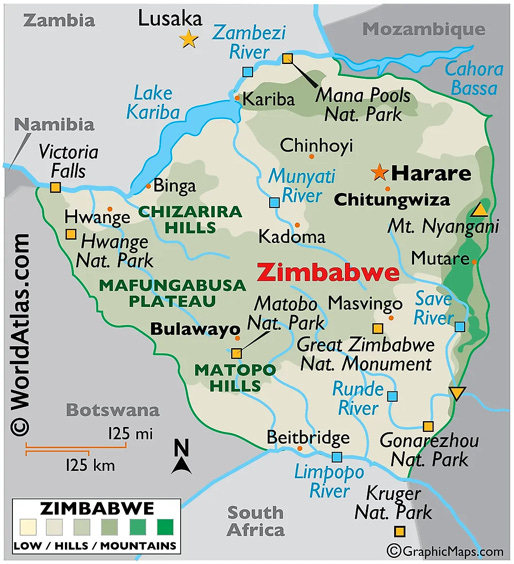



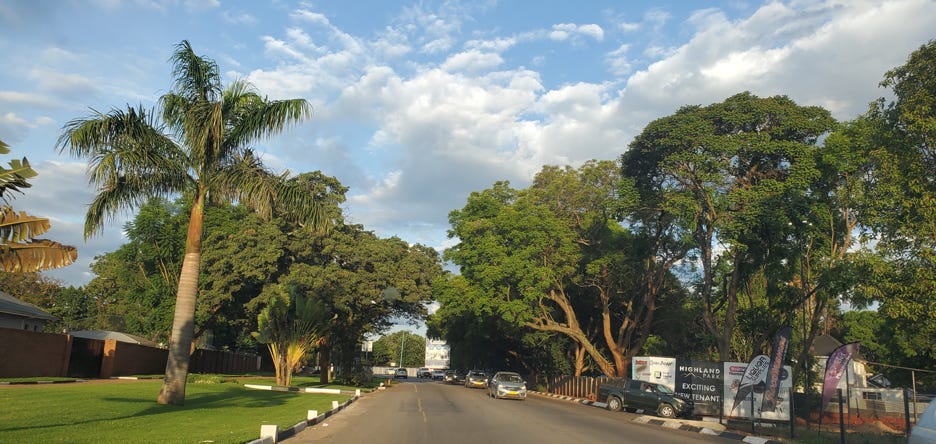

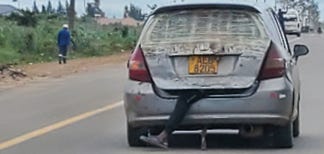
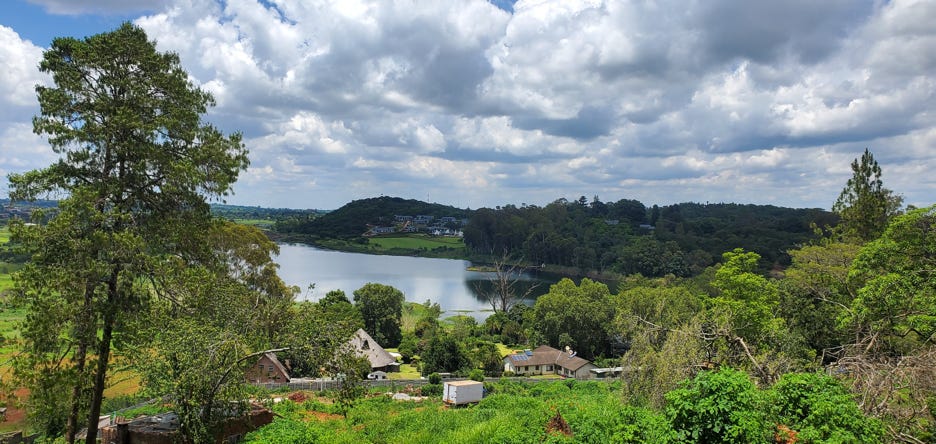
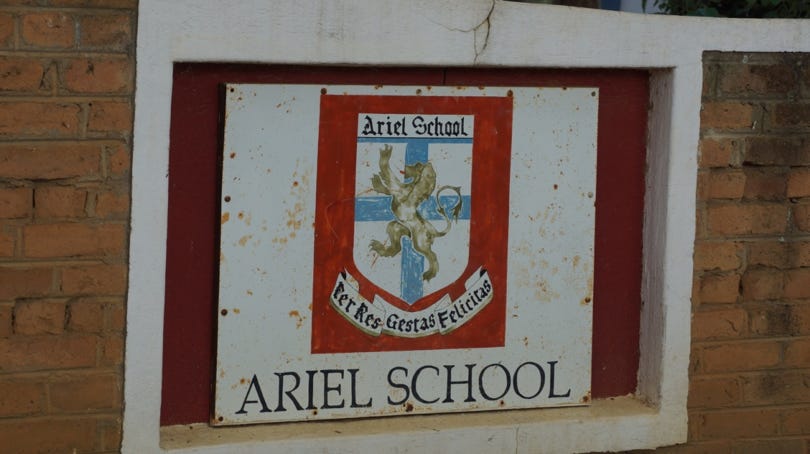
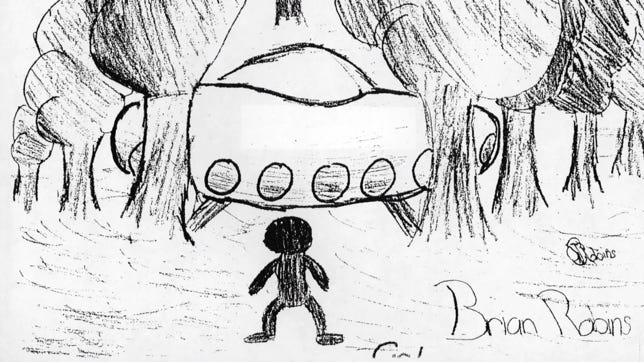
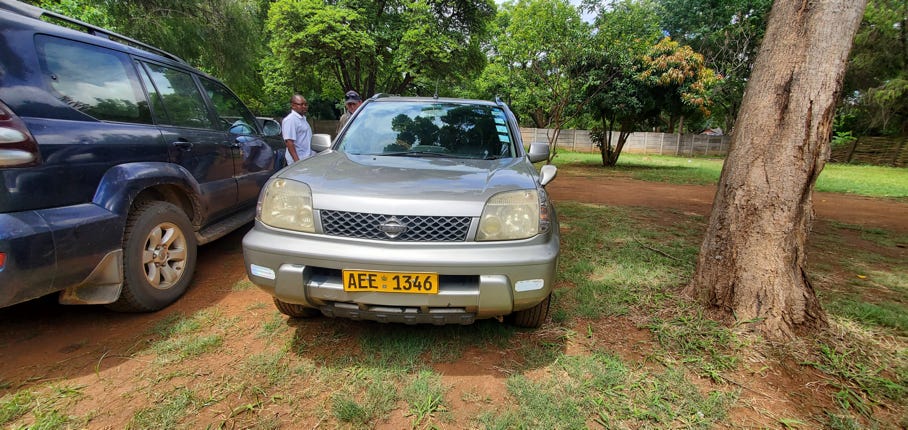
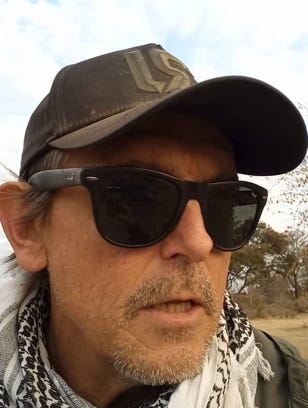

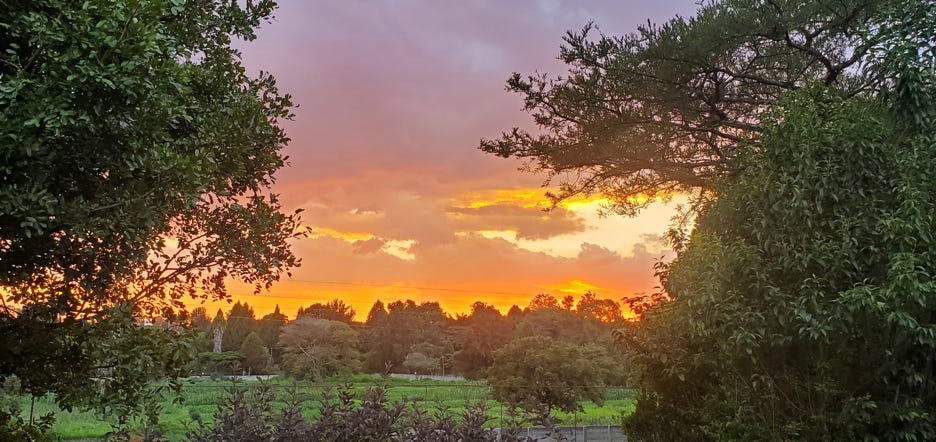
Years back I didn’t believe in ghost or ufo’s. As time has gone on my mind has changed. Here is a video of a ufo above my garage right in my back yard. If you can blow the video up and follow the light, you can see there are colored lights in the object. https://share.icloud.com/photos/07aY7-CkR2uQWLtsa6svJeSBQ
Not to add to your thoughts that James has lost his marbles!!!, our NH house is haunted. My wife has heard music, voices, and smelled smoke. Shades have fallen off windows, doors slam, one time the door slammed so hard the window broke. I was in the garage and had just hung up some hooks and put extension ladders on them, I was 5 feet from them, and someone ran their hand clapping on each rung. Never in my life have I ever experienced so many paranormal activities as we do at our house in NH. I’m not crazy, J.Goodrich
Circadian-rhythmically-challenged trans-chicken 😂😂